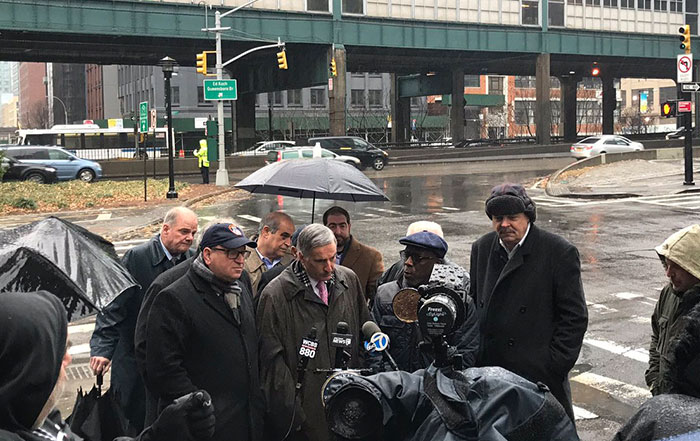Photo Courtesy of Assemblyman Weprin’s Office
Assemblyman David Weprin (c.) on Sunday delivers remarks opposing congestion pricing.
By Michael V. Cusenza
With the archaic city subway system still in a state of widespread disrepair, funding New York City Transit President Andy Byford’s 10-year, $40 billion “Fast Forward” plan to modernize the century-old behemoth is a front-burner item for the State Legislature in 2019.
Governor Andrew Cuomo on Monday once again pushed for the passage of a proper congestion pricing plan in order to “overhaul the outdated structure of the [Metropolitan Transportation Authority] in order to build a reliable, state of the art mass transit system with a steady funding stream and a structure that supports operational excellence.”
Earlier this year, Cuomo’s Fix NYC Advisory Panel released its highly anticipated report that endorsed a congestion pricing plan to relax traffic bottlenecks on Midtown Manhattan streets and help subsidize the revolution of the city’s antiquated subway system. According to the proposal, all drivers would be charged to enter the Central Business District – an area bounded by 60th Street on the north and Battery Park on the south, the Hudson River on the west and the East River on the east – during weekday business hours. Car drivers would be charged $11.52; trucks, $25.34; cabs and app-based for-hire vehicles, $2 to $5 per ride. The revenue generated by such a tolling initiative would most likely exceed $1 billion annually, Fix NYC noted.
However, congestion pricing is not, by any measure, wildly popular.
On Sunday, a coalition of elected officials, union reps, and concerned residents held a press conference at Queens Plaza North expressing strong opposition to any proposed congestion pricing plan—or “tax,” as they have characterized it.
“A congestion tax would be disastrous for Queens, Brooklyn, and Long Island residents,” said Assemblyman David Weprin (D-Fresh Meadows). It could cost a commuter hundreds in additional expenses each month. It would raise the cost of doing business with the cost of congestion taxing being passed onto businesses. It would raise the cost of consumer goods, with business passing along extra costs to consumers. It would limit the competitive ability of these local small businesses; and it would impose a monetary barrier to Manhattan for outer borough residents, who often travel to the city to visit a doctor, watch a show or enjoy a night out in Manhattan. New York cannot burden the backs of these other borough working and middle class residents, already struggling with the rising costs of living with a new congestion tax. We must find alternative funding streams including the restoration of a commuter tax, an increase in the gas cap, ads the use of revenue from marijuana legalization for transportation funding.”
City Councilman I. Daneek Miller (D-St. Albans) added, “My Southeast Queens community shouldn’t be forced to pay a regressive and burdensome tax when it doesn’t have a multitude of accessible transit options like those in Manhattan, especially when programs such as the reduced fare LIRR Atlantic Ticket offer viable alternatives that actually benefit outer borough residents. Transportation is the great equalizer between communities, but there is no equity to be gained from congestion pricing.”

